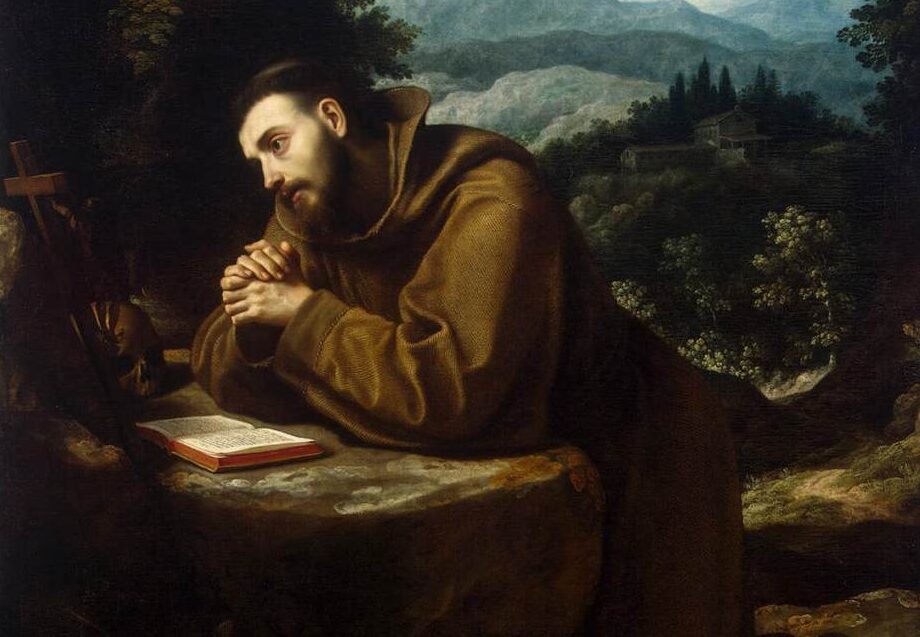In possibly his most magnificent written work, St. Francis of Assisi gave us the “Canticle of Brother Sun.” It was sung as he departed this world. This artistic work summed up the saint’s love, personal devotion and deep affection for all the works of God’s creation and the thanksgiving experienced in being part of that creation and sharing divine love and tenderness. “Most Mighty, Omnipotent and Good Lord,” the canticle begins, and streams through Francis’ profound reflection of God’s dazzling brilliance and creativity as he relates all of the gifts of creation given to man by God because He loves him. The list is brought to closure as the saint draws attention in praying: “Praise be to You, my Lord, for Sister Death, from which no living man may flee; woe to them who die in mortal sin; but, blessed are those who shall find themselves in Thy most Holy Will; for Death shall not harm them.”
The “Catechism of the Catholic Church” teaches us that, “Death is a consequence of sin. The Church’s magisterium, as the authentic interpreter of the affirmations of Scripture and Tradition, teaches that death entered the world on account of man’s sin. Even though man’s nature is mortal, God had destined him not to die. Death was, therefore, contrary to the plans of God the Creator and entered the world as a consequence of sin. ‘Bodily death from which man would have been immune had he not sinned’ is thus ‘the last enemy’ of man left to be conquered.” (CCC #1008)
We must be prepared for death by learning how to detach ourselves from this world.”
Many of you who have read these pages with any degree of regularity, might remember that I have identified myself as something of an apocalyptic thinker; namely, I am always looking out for death with some sense of anticipation. Some friends, who do not know me better, might find my thinking a bit morbid or to the least dour. Nevertheless, I find myself in the light of Isaiah, the prophet, who at the beginning of Chapter 64 of his prophecy, prays: “O that you would tear open the heavens and come … so that the mountains would quake at Your presence. (Is 64:1ff) Such faith is reassuring in so many instances of human life and it is found in many places of sacred Scripture.
“Death is transformed by Christ. Jesus, the Son of God, also Himself suffered the death that is part of the human condition. Yet, despite His anguish as He faced death, He accepted it in an act of complete and free submission to His Father’s will. The obedience of Jesus has transformed the curse of death into a blessing.” (CCC #1009)
There are, of course, so many teachings of Jesus we have failed to put into practice. Since we know so little about the life of Jesus, and in even so many more ways have reduced His life into some sort of myth or fairy tale, our association with His death and resurrection becomes even more indistinct in our contemporary lives.
It is strange to consider how many Catholics die and have no remembrance offered for the fact that they even existed! Many family members do not offer the sacrifice of the Mass in their parish churches for the repose of the souls of their parents and other family members. Many are too afraid, themselves, of praying for the dead. Many of us don’t take time to prepare ourselves for death. We fail to understand the necessity to be ready for our own death. Bishop Fulton Sheen once reminded a congregation about the greatest fears we have about death. He pointed out the obvious fact that we fear death so much because we don’t practice for it. He taught that we must be prepared for death by learning how to detach ourselves from this world. Being detached from this world is very difficult. We are controlled by so many things. Death reminds us that nothing in this world is as necessary as having God in our life. By practicing for death this way—not in some morbid or terrifying way—we surrender each day, preparing for only God in our life.
The Church, through the liturgy and the sacraments, teaches us to surrender ourselves to God. The world does not. The world teaches us to connect ourselves more and more to the things of this world. Why? Because the world does not believe there is more than this world—and there is! There is so much more.
We are taught by the saints to follow Jesus and prepare ourselves now to be with Him forever in heaven. St. Francis’ canticle ends beautifully and is filled with hope: “Praise You, and Bless You, the Lord, and Thank You, the Lord! And be subject unto You with great Humility!” What a way to live—what a way to die!
BY BISHOP WILLIAM PATRICK CALLAHAN, Bishop of La Crosse
Published in the November 2022 issue of Catholic Life Magazine

